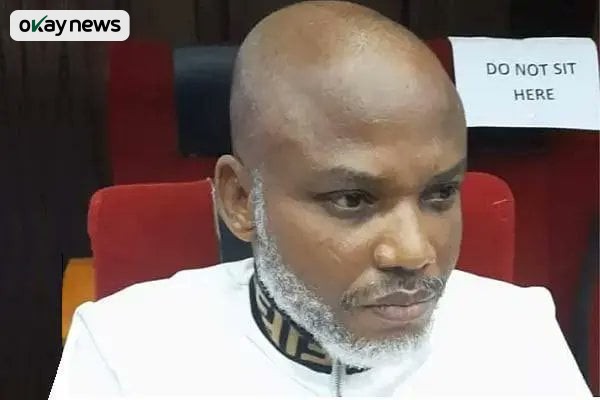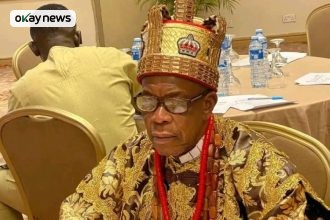Okay News reports that the Court of Appeal in Abuja, the capital city of Nigeria in West Africa, has dismissed an appeal filed by Nnamdi Kanu, the convicted leader of the Indigenous People of Biafra, a separatist organisation seeking an independent state in southeastern Nigeria. The appeal challenged alleged violations of his fundamental rights by the Director-General of Nigeria’s Department of State Services, the country’s domestic intelligence agency, and Nigeria’s Attorney-General of the Federation, who serves as the chief law officer of the nation.
A three-member panel of the appellate court ruled that the appeal had no merit because the issues raised had become academic following Kanu’s conviction and life imprisonment sentence delivered by the Federal High Court in Abuja on November 20.
Delivering the lead judgment, Justice Boloukuromo Ugo stated that the claims made by Kanu— which included complaints of denial of adequate medical attention, alleged mistreatment, and restriction of religious freedom — could no longer be entertained. According to the judge, this was because Kanu was no longer in the custody of the Department of State Services but had already been moved to a correctional centre.
Justice Ugo further explained that Kanu’s counsel, Maxwell Opara, confirmed at the beginning of the appeal hearing that his client was being held at the Sokoto Correctional Centre in northern Nigeria. This, the judge said, made Kanu’s earlier request for transfer from DSS custody to Kuje prison in Abuja irrelevant.
The court noted that Kanu himself had previously expressed a preference for prison custody instead of DSS detention, and therefore his prayers had been overtaken by events due to his conviction and lawful remand.
The appeal was targeted at reversing a July 3 decision delivered by retired Federal High Court judge, Justice Taiwo Taiwo, who had dismissed Kanu’s earlier fundamental rights enforcement suit because the IPOB leader failed to prove the allegations.
The respondents in the case were the Director-General of the Department of State Services, the Department of State Services itself, and the Attorney-General of the Federation.
The original suit, filed in December 2021 and marked FHC/ABJ/CS/1585/2021, contained allegations by Kanu that his health was deteriorating while in DSS custody and that the medical personnel attending to him were unqualified. But counsel representing the DSS, Idowu Awo, told the court that Opara had failed to present any evidence showing that the medical personnel were “quacks.”
Similarly, the lawyer representing the Attorney-General of the Federation, Simon Enoch, asked the court to dismiss the suit.
In the judgment of the lower court, Justice Taiwo held that Kanu did not provide credible evidence that he was tortured, denied his religious rights, or denied adequate medical treatment. The judge also ruled that although detainees have a right to practise their religion, such practice must not disturb the rights or peace of others within the detention facility.
On the medical claims, the court held that Kanu failed to bring any medical expert to substantiate his allegations.
Consequently, the Federal High Court dismissed the suit for lacking in merit, a decision now affirmed by the Court of Appeal.







